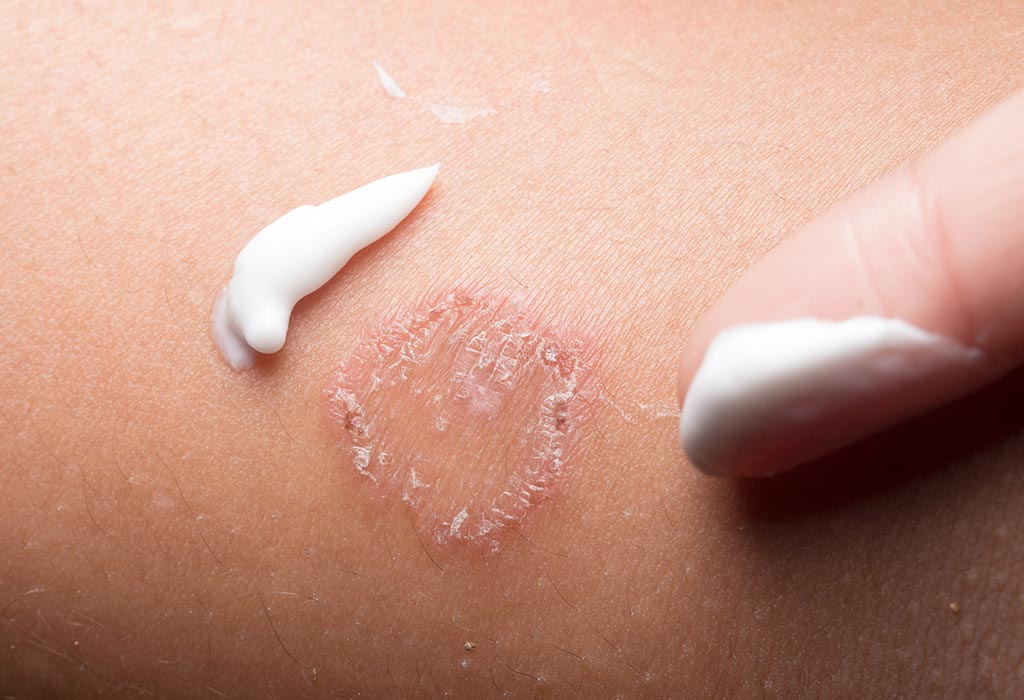The term ringworm can be confusing as people may perceive ringworm to be a worm infection. But ringworm is, in fact, a fungal infection triggered by a fungus. Ringworm is a highly contagious infection of the scalp or skin which can commonly occur during pregnancy. In medical terms, ringworm is called tinea. Ringworm infection can be of several types depending on which body part it affects like tinea capitis (the scalp), tinea corporis (the body), tinea pedis (the feet), tinea cruris (the groin), and tinea manus (the hands). In this article, we will discuss ringworm affecting pregnant women, the symptoms, treatment, remedies and prevention. Read on to find out everything you need to know about ringworms.
All You Need to Know ABout Ringworms During Pregnancy
Symptoms of Ringworms During Pregnancy
Some of the symptoms of ringworm infection can be:
- The skin may appear inflamed with round patches which form a distinct ring.
- In some cases, the skin in the centre of the ring may be clear.
- The skin may become blistered or scaly.
- The skin may feel very itchy.
- In case the ringworm infection affects the scalp chunks of hair may start to fall out.
Risk factors of Ringworms During Pregnancy
In most cases, it is highly unlikely that ringworm can have a negative impact on the pregnancy. Some of the points that you may like to keep in mind are as follows:
- A pregnant woman is at a similar risk of catching ringworm infection as any other healthy person as the skin infection is easily transmissible.
- Ringworm during pregnancy may not cause any harm to the unborn baby.
- The fungus responsible for the skin infection feeds on the dead tissue that is present on the skin’s surface and cannot invade into the deeper layers of the skin.
- In very rare cases even if the fungus does manage to enter it cannot survive in the mucous membranes.
Treatment for Ringworms During Pregnancy
It is generally easy to treat ringworm infection. But during pregnancy, it is important to be careful while taking oral medications as some medicines can adversely affect the well-being of the baby. So always refer to a doctor in case you get infected with ringworm while pregnant. The doctor may recommend a topical cream comprising of triamcinolone and nystatin to cure the infection. Applying the cream twice everyday or as prescribed by the doctor may bring relief from discomfort.
Home Remedies for Ringworms During Pregnancy
Some home remedies that may help to treat ringworms can be:
Turmeric
Turmeric contains curcumin which is antifungal and anti-inflammatory. Sprinkling turmeric on the infected skin may help in restricting the growth of ringworm and also speed up the healing.
Ginger tea
Ginger tea also has antifungal properties. Drinking ginger tea may help you heal faster. Dapping ginger tea on the affected area may help in providing relief from likely discomfort.
Garlic
Garlic is popular for its therapeutic goodness as it contains ajoene. Applying a few crushed cloves of garlic on the infected skin may hasten the healing process. You can also use garlic oil.
Coconut oil
You may find smearing some coconut oil on the affected skin helpful in soothing the distressed skin as it is both antifungal and microbial.
Potato
Placing pieces of potato on the influenced skin may prove useful in curing the ringworm infection.
Apple cider vinegar
Apple cider vinegar with its antifungal properties can be an effective cure in alleviating the symptoms of ringworm infection.
Aloe vera
Aloe vera is a safe and natural remedy for fungal infections. Spreading aloe vera gel on the infected skin a couple of times every day can bring respite from inflammation and itchiness.
Prevention for Ringworms During Pregnancy
Maintaining good hygiene when pregnant can help prevent ringworms. Washing the infected skin with clean water and a disinfectant cleanser may help limit the spread of infection. Gently pat dry the skin. It is unwise to share clothing, towels, combs and other personal things. Pregnant women may try and avoid coming in physical contact with an infected person. Ringworm infection can also pass on to a pregnant woman from an infected animal or public places like swimming pools or locker rooms as the fungi thrive in moist places. So it’s best to avoid such places while pregnant.
The fungal infection is usually self-treatable. However, in case, a pregnant woman contracts the ringworm infection it is sensible to seek a medical diagnosis for the condition. Other than causing irritation and discomfort ringworm during pregnancy is unlikely to produce any other negative effect on the pregnancy. However, if you fear that you can’t treat ringworm alone or you need any kind of help, and then always go to a doctor.
References
https://www.ncbi.nlm.nih.gov/pmc/articles/PMC5621188/
https://academic.oup.com/cid/article-pdf/27/5/1151/1299125/27-5-1151.pdf
